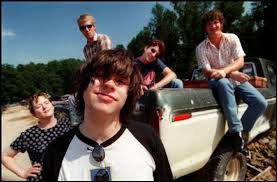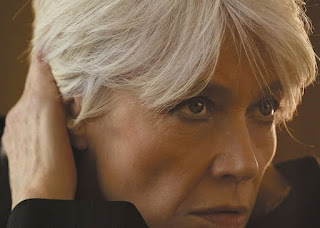...because after 15 volumes this series finally leaves the 70s and 80s behind to take a first foray into the 90s. The 90s were a weird decade for me, musically. They were my teenage to young adult years, so I was somewhat caught between the music of my peers (with all that that implies in a decade like the 90s) and trying to find my own interest and path in things that weren't on the charts, often while rifling through my dad's vinyls and feasting on music from yesteryear.
But this specific situation also means, that I play a little more loosely with the 'hidden' part of the series subtitle. Several songs on here were actually sizeable hits, but none were world-wide mega hits, often hitting in one country or part of the world, but not others. Either way, these songs deserve to be heard, and that's what All Pearls, No Swine is all about...
Don't expect this to happen for future volumes, because it takes a while and makes for a really long post, but - as a first in APNS history - here are honest to goodness liner notes.
Whiskeytown - Take Your Guns To Town
Energetic opening track from Rural Free Delivery, the EP of outtakes they gave to Mood Food in exchange of getting to sign with Outpost Recordings. All the things that made Whiskeytown great are on here. Reminds you how good Adams was back in the days.
Bif Naked - Daddy's Gettin' Married
Fellow canadian Bif Naked, né Beth Torbert, was getting some "next big thing hype" in 1996, when everybody was looking for the new Alanis Morisette. It never happened, but "Daddy's Gettin' Married" - originally on her self-released debut album from two years earlier - then remixed and re-issued is a great little rock number.
Junkhouse - Burnt Out Car
Picked this up as a brown paper bag special full of 'surprise' maxi CD's for little money. Most of it was unknown crap of course, but this ballad by Canadian heavy rockers Junkhouse stood out easily. The details of life as a homeless person are captured excellently, Sarah McLachlan offers great vocal support. "Another Day In Paradise" this isn't.
Quiver - Stanley Jonesin'
A weird sort of proggy 60s-influenced blues band I found by accident when I looked for the early 1970s band Quiver that fused with the Sutherland Brothers later on. I thought "Stanley Jonesin'" had a good groove, though it went way too long, so I created this "single edit" for a singke that never was. In the Brit Pop era it could have been, though.
When a single sells, despite the artist depiction looking like a mug shot...
Jimmy Nail - Big River
One of the greatest songs of the decade, or any decade. Nail's nostalgic homage to his father and his hometown Newcastle was a top twenty hit in the UK and features great guitar work by Mark Knopfler. My dad wasn't a stevedore and I'm not a Geordie, but "My daddy was a working man / he earned his living with his hands" is totally true and the song's look on loss and carrying on is immensely touching, whether the song's specifics apply or not. The APNS cover for this volume is inspired by this great song, depicting Nail's big river: "...it was mine, the coaly Tyne..."
Liquido - Narcotic
A top hit in its country of origin Germany, as well as a bunch of neighboring countries (Switzerland, Austria, Belgium and Italy), one hit wonder Liquido's singer-songwriter Wolfgang Schrödl (now here's a teutonic name for ya) came up with the impossibly catchy synth line on an old Roland D70. Like Van Halen's "Jump", it's proof that if the synth line is catchy enough, the song has no chance but to be awesome.
Marcella Detroit - Lay Down Sally
Detroit, back when she was known as Marcy Levy, of course co-wrote this song with ol' Slowhand back in the day. She pulled it out as a b-side to her "I'm No Angel"-single in 1994. I really like the sleek, but relaxed groove on this.
Electrafixion - Sister Pain
Arty cult band from the 80s undercover, part one. When the brain trust of Echo & The Bunnymen, Will Sergeant and Ian McCullough decided to collaborate again in 1994 they chose the moniker Electrafixion. This is one of the singles of their lone album, in a stripped down acoustic version.
Thom Bishop - American Reel
I didn't know much about Thom Bishop until researching him for these liner notes, since I picked up an album of very slick, rather unmemorable L.A. rock out of a "surprise bag" for little money. So color me surprised: Folkie and singer-songwriter since the early 70s, fiction writer under pen name Junior Burke, had his songs covered by Ritchie Havens and Bob Dylan, among others. Well, you never stop learning. Out of Restless State of Grace, the storytelling song "American Reel" sticks out and overcomes the production of its time.
You have it black on white: these dudes hardly know each other...
Stiltskin - Inside
Another not so hidden gem, a UK chart topper and top ten hit in most European countries, though success was more modest stateside. Stiltskin wasn't much of a band, more of a project for musician Peter Lawlor who wrote all the music and on this number plays all the instruments. Lead singer Ray Wilson parlayed his five minutes of fame into a shortlived stint as frontman of Genesis. Considering the stitched together nature, Stiltskin broke up shortly after. The song? Still a total banger, as the young would say.
Rain Tree Crow - Blackwater
Arty cult band from the 80s undercover, part two. When the members of cult band Japan regrouped in the early 90s, they did so under moniker Rain Tree Crow. What was supposd to be an ongoing adventure became a one-off, but the absolutely magnificent "Blackwater" remains a testament to the band and David Sylvain's vocal brillance.
Tanita Tikaram - I Might Be Crying
One hit wonder strikes back! There's many things I like about "I Might Be Crying": its Enya-like vocalizing at the beginning, its chugging beat and Tikaram's voice. Surprisingly, since "Twist In My Society" has always bothered me.
Color Me Badd - All 4 Love
Another not so hidden gem, no. 1 hit stateside and chart hit in a number of countries. For a short moment, Color Me Badd were huge - no mean feat for a r'n'b band from *checks notes* Oklahoma City?! - but are almost entirely forgotten today. "All 4 Love" is a great, bouncy number, whose dizzy, sort of goofy energy and endless catchiness carry it nicely.
Ok, maybe these guys took the band name a little too seriously...
John Wesley Harding - Other People's Failure
'Elvis Costello's wise-ass kid brother' was the label most used for Harding, and it's totally on the money. Harding's vocal timbre is amazingly close to Mr. McManus', and so are his witty observations. "Maybe you're insecure / neck deep in life's manure" wonders Harding to start before contemplating what makes people take pleasure in other people's failures. People gonna people, JWH. Really good song, though.
Sister Double Happiness - Wheel's A -Spinning
Sister Double Happiness were known for their crunchy, blues-inspired hard rock, which admittedly isn't too much my shot of whiskey cup of tea. But when they went acoustic and unplugged, as on "Wheel's A-Spinning", good things could happen. And they do here. Catchy and bouncy.
Robert McEntee - Like Thunder
McEntee already showed up on my Blue Rose label compilation, he's a veteran songwriter from Texas who in his Fifties finally cut his debut album, which included a number of low-key Americana gems like "Like Thunder".
The Nitty Gritty Dirt Band - I Fought The Law
The Dirt covers The Clash. I like the redneck-y outlaw energy and usual lovely arrangement the Dirt Band brings to this.
Aztec Camera - Good Morning Britain [Mendelsohn Single Mix]
Any Roddy Frame, mostly known as Aztec Camera, is surely welcome, especially if Mick Jones as special guest is invited. "Good Morning Britain" is one of the best numbers off 1990's Stray, in a different mix from the album and original single release.
Yup, that's Britain all right...
Geoff Smith - Six Wings (Blissout)
Another brown paperbag special. I even picked up the album in a second-hand store afterwards. On that one, Mr. and Mrs. Smith are doing neo-classical adaptations of Emily Dickinson poetry. Not being an expert on such fare, it's pretty good, but I rarely listen to the whole thing. In order to have a single, they mixed "Six Wings Of Bliss" into a trip-hop inspired pop version.
Type O Negative - Summer Breeze
This is my "Summer Breeze". I've never heard the soft-as-a-baby's butt original from Seals & Croft until a couple of years ago, but Type O Negative's chilling cover, which sounds like warm-up music for a serial killer on the prowl, has been with me since the mid-90s. Seriously, the lines about the curtains floating in the window take on a whole new meaning in this version. Better check if you closed all windows there...





















.jpg)


.jpg)






















